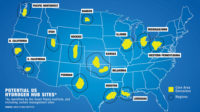Voters to Decide Fate of $4 Billion in State Bond Issues
But NCSL senior fellow Jennie Bowser says voters approved 73% of bond amounts proposed on 2008 ballots and 65% in 2010. "They almost always get approved," she says. "I think voters recognize that this is long-term borrowing—it's not usually accompanied with a big tax increase."
Initiatives Also May Affect Business
Industry firms and interest groups also are watching the outcome of key ballot initiatives. In Michigan, voters are weighing a measure to increase the state's renewable-energy standard to 25% by 2025. A Michigan State University study says it would double the number of so-called green jobs in the state.
Opponents say the measure would deprive Michigan's energy industry of flexibility to negotiate changing market conditions. Former state Senate Majority Leader Ken Sikkema (R), now a consultant, described it as "radical," saying Michigan would be the only state to mandate a renewable-energy standard.
Also on industry's radar is the outcome of another Michigan measure that would require a majority of voters to approve allocations of state funds for land acquisition, design, construction and other tasks related to "new international bridges or tunnels not … serving traffic as of January 1, 2012."
The initiative marks the latest move by billionaire Manuel "Marty" Maroun, owner of a toll bridge between Detroit and Windsor, Ontario, to halt a proposed second bridge between the cities.
But Gov. Rick Snyder (R) says the proposal won't interfere with the new span. "Agreements for the project already have been signed, and we're in the process of permitting," says a spokesman. He says the $3.5-billion project will create 10,000 construction jobs.
But due to "sloppy wording," other projects may suffer if the proposal passes, says the spokesman. Two state polls indicate voter support. "There's a lot of misinformation floating around out there," he adds.
Industry interests also are watching whether Maryland votes to expand gaming and whether Arizona renews a 2010 voter-approved 1¢ sales tax that would generate $100 million for transportation projects.
Industry interests have pumped in $350,000 to support the measure, but opponents, including Gov. Jan Brewer (R), say it would limit the Legislature's ability to balance the state budget.
In California, unions are fighting a proposition again on state ballots that would bar them from collecting funds from member paychecks for political purposes. Voters rejected the measure in 1998 and 2005 by small margins, says the Initiative & Referendum Institute, Los Angeles.
"The Election Day results on these and other bond questions will provide an important snapshot of the electorate's appetite for state financing of big transportation, educational, wastewater and other projects," says a spokesman for the American Subcontractors Association. "ASA is also watching other ballot measures—such as the New International Trade Crossing ballot question in Michigan—for signs as to whether the electorate feels projects delivered through alternative project financing, using private investments through public-private partnerships (P3s), will deliver the cost savings they promise."
| Major Election-Day Bond Measures on State or Local Ballots in ($) millions. Some amounts are maximum to be issued; amounts are rounded. | ||
|---|---|---|
| Location | Amount | Purpose |
| Houston* | $2,700 | Public schools, community colleges, municipal facility upgrades |
| Arkansas** | $1,300 | Transportation |
| Alabama | $750 | General obligation |
| New Jersey | $750 | Higher-education capital projects |
| Alaska | $454 | Transportation |
| Oklahoma | $300 | Water resources, wastewater treatment |
| New Mexico*** | $200 | Higher-education, libraries, facilities for seniors |
| Rhode Island*** | $171 | Veterans’ housing, higher-education, affordable housing, environmental management, water infrastructure |
| Maine | $76 | Transportation, higher education, drinking water, land conservation |
| SOURCES: NATIONAL CONFERENCE OF STATE LEGISLATURES; BALLOTWATCH/INITIATIVE & REFERENDUM INSTITUTE, UNIVERSITY OF SOUTHERN CALIFORNIA AND ENR RESEARCHNOTES: *OTHER STATE MUNICIPALITIES ALSO HAVE LOCAL BOND ISSUES ON their BALLOTs IN LESSER AMOUNTS. **PROPOSED 0.5% SALES TAX TO BACK TRANSPORTATION BONDS. ***MULTIPLE BOND ISSUES ON BALLOT. |
From Robert Wendel<br/><br/>Texans should try to understand the concept of state income tax deductions on their Federal taxes, and get over their overwhelming hatred for state taxes. Th...
Texans should try to understand the concept of state income tax deductions on their Federal taxes, and get over their overwhelming hatred for state taxes. The reason that northern states have income taxes is that it keeps more money in local coffers, instead of sending money to the federal government that they never get back. Try looking at a table that shows each states contribution to federal income tax receivables, and the amount of federal money that comes back to the state. Most southern states lose, making it more important that tax money stay in-state. What a concept!




